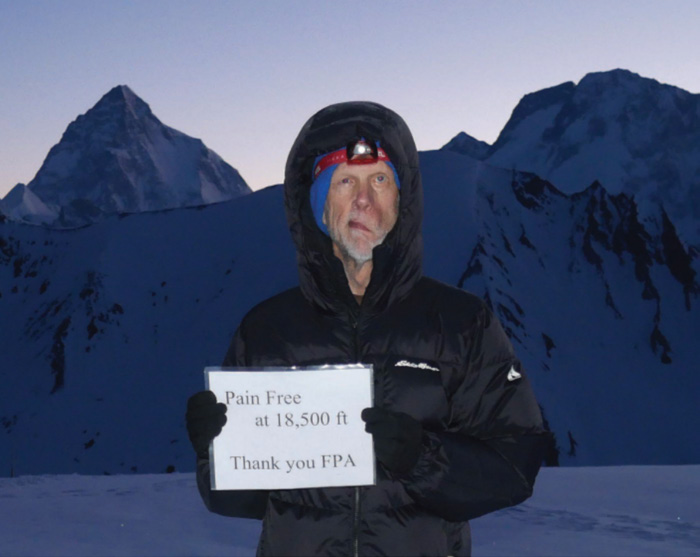Your body’s response to barometric pressure
For some people, why does weather affect their facial pain? The next time you watch the weather forecast, notice the barometric pressure, measured in inches. Numbers such as 30.04 will be followed by “rising,” “falling,” or “steady.” Typically, when a low pressure front is coming, it signals not only a change in the weather, but a drop in the barometric pressure, which is pressure against the Earth’s atmosphere.
Remember when Grandma would say, “Rain’s coming, and I can feel it in my joints?” She actually knew this because of what happens to our bodies when the barometric pressure changes. That means that the pressure against your body drops as well, and your joints and areas that are injured can begin to swell. This swelling causes increased inflammation, and requires hormones to deal with this increased activity in our bodies. Increased use of these hormones can cause depletion of them, too. Our body is not a bottomless pit when it comes to its defense systems.
Cortisone
We have, nestled atop each kidney, a small gland that produces both adrenaline and cortisone. These two hormones help us with energy, mood, immune function, pain management, and the famous “flight or fight” response. The steroid cortisone is fundamental in managing pain, immune function and energy. When cortisone levels drop, these can all become a problem.
Adrenaline
Adrenaline is famous for energy and strength. We all know stories of how a man demonstrates sudden superhuman strength when he picks up something heavy like a car, rescuing a child who is trapped underneath. Did you ever notice how your cold or pain gets worse at night? That is because our bodies slow production of both adrenaline and cortisone in the evening so we can go to sleep. It’s part of our circadian rhythm. The downside is the fact that we don’t have these hormones that help us feel better, either. So, our cough gets worse, and our pain goes through the roof. Something similar happens when a storm is coming.
The smell of a storm
Did you ever know someone who could “smell” snow or rain before it came? What they “smell” is a change in the electrical charge in the air. It’s been described as a “metallic” smell. All atoms have either a positive or negative charge so they can bind to form molecules. As the barometer falls, the positive charge, or “ions” increase which causes a depletion of cortisone in the body. This happens to all creatures that have adrenal glands—in other words, all mammals.
People who are chronically stressed, either physically or emotionally, may experience weather changes more acutely. The elderly will experience it more acutely as well, as their bodies don’t have the ability to overcome these changes as easily as they did when they were younger. Because of our dependency on caffeine, we drink another cup of coffee, eat chocolate, or sip tea in order to suppress fatigue that signals a drop in pressure, but do not understand why our knees hurt more.
Counteracting the weather’s effect on facial pain
So what can you do to manage this? Well, depending on the problem, whether it is pain, mood, or energy, there may be a solution. If the problem is simply energy, stay away from simple carbohydrates such as sugar, starches, and junk food. Eat foods that will sustain you and not bring the “crash” you feel after that morning donut. Do not assume that caffeine is the answer, either. Consult a nutritionist if you need ideas for controlling simple energy problems.
Chronic pain, chronic fatigue, and depression all present unique challenges. They all can be affected by nutrition, exercise, sunlight, and barometric pressure, as well as by chemical imbalances. It is not a good idea to self-diagnose and self-treat when there may be medical problems causing these fluctuations in mood, energy, and pain, but once diagnosed by a professional, there are things that you can do to improve your response to the environment.
Chronic pain can respond to pain management techniques. To be effective, though, these techniques require daily practice. Choices include relaxation or hypnosis techniques (including guided imagery and tapes), biofeedback, acupuncture, acupressure, Reiki, massage, chiropractic, and aquatherapy. You may have to try several before you find one that you like and that works well for you.
Chronic fatigue still is poorly understood, although it can have a profound effect on mood. Diet, particularly the avoidance of carbohydrates, can help. Depression has been described as a “chemical imbalance” but that is only part of the story. There are theories of genetics or the environment, such as family influence, prenatal care, or biohazard exposure. It also can be a manifestation of electrical problems in the brain, and that can be treated with neurofeedback.
The barometric pressure can have a profound effect on mood as well, especially if it is interpreted as an increase in depression versus a drop in energy. How we interpret changes in our mood will have major effects on the mood itself. For instance, if we interpret a simple burst of adrenaline as anxiety, then we may have a panic attack. If we are tired from a long week, we can see this as depression rather than a body that just needs a rest.
Can Grandma predict the weather? Yes, sometimes she can, especially if she has arthritis or bursitis. Most of us don’t need a sophisticated meteorologist’s maps and predictions to know if we are hurting. But perhaps we can take measures to diminish the impact that an impending storm may have on us. We can eat properly, exercise, avoid the negative effects of drugs or alcohol, and use pain management techniques to control the chronic pain. Beware, however, of rebound pain that we can experience the day after “extra” doses of pain meds, whether they are for a bad back, joint or muscle pain, or a headache. The pain often can be as bad or worse the next day because of withdrawal from the medicines taken the day before. Consult a professional about your mood, pain, or energy. Help can be simply a phone call away.






























